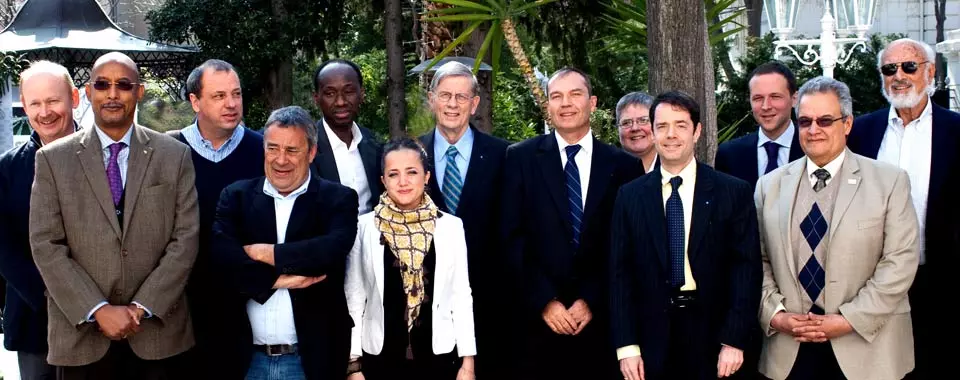
All share concern for the elimination of the causes of cholera, and establishment of preventive techniques, to control endemic cholera and other water borne infectious diseases. The representatives who serve as a Council of Advisors to the Alliance are considering ways to increase the coordination of their individual and organizational efforts to achieve a comprehensive and integrated cholera prevention program in each of the targeted areas.
The G.A.A.C. is directed by Dr. Ibrahim A. Mayaki, who is also serving as the Chief Executive Officer of the Aftican Union Development Agency (AUDA-NEPAD), a Development program sponsored by the African Union. He formerly served as Prime Minister of Niger.
The members :
The G.A.A.C.'s president:
Dr. Ibrahim Mayaki - Chief Executive Officer, Auda-Nepad - South Africa
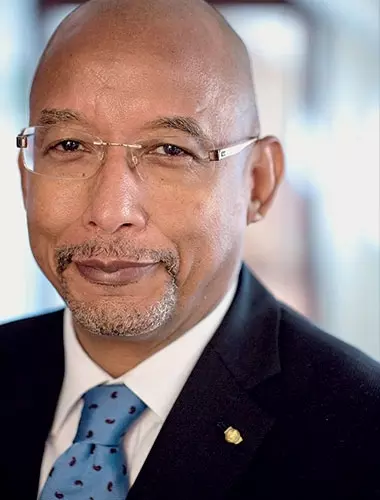
Dr. Mayaki, is the author of the book, entitled “La caravane passe…” relating his political career.
- July 5, 2019: NEPAD became the African Union Development Agency (AUDA-NEPAD).
- April 1, 2009: Dr. Mayaki took up his assignment in the NEPAD Secretariat as CEO, in Midrand, South Africa.
- January 31, 2009: The appointment of Dr. Ibrahim Assane Mayaki was announced by the Chairperson of the African Union Commission, H. E. Dr. Jean Ping during the 20th Summit of the NEPAD Heads of State and Government Implementation Committee (HSGIC), in Addis Ababa, Ethiopia. The appointment was formally endorsed by the NEPAD Implementation Committee and subsequently by the 12th AU Assembly on February 2, 2009.
- 2004: He was appointed as the Executive Director of the Platform in support of Rural Development in West and Central Africa, the Rural Hub, based in Dakar, Senegal, from where he was recruited as NEPAD Chief Executive Officer. He was appointed following a selection process that took several months to complete, under the auspices of the African Union Commission.
- 2000-2004: Dr. Mayaki was a guest Professor at the University of Paris XI, where he lectured on international relations and organizations; he also led research at the Research Center on Europe and the Contemporary World within that university.
- August 2000: he set up the Analysis Center for Public Policy.
- November 1997-January 2000: he was appointed Prime Minister of Niger.
- 1996-1997: He was successively appointed Minister in charge of the African Integration and Cooperation and Minister of Foreign Affairs of Niger.
- 1970’-1980’: He worked as a Professor of Public Administration in Niger and Venezuela.
The others members:
Dr. Robert Bos - Senior Advisor, International Water Association - Switzerland
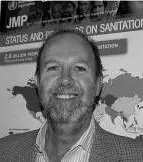
He holds M.Sc.'s from the University of Amsterdam in medical biology and in basic and clinical immunology. He has worked in East, West and southern Africa, in South and South-East Asia, and in Central America.
Currently, Dr. Robert Bos is senior advisor to the International Water Association on a part-time basis, tasked with work on the human rights to water and sanitation, human resources assessment and resource mobilization strategies.
2013: Retired from the World Health Organisation (WHO).
2009-2013: In his position of Coordinator, Water, Sanitation, and Health, he led WHO efforts in the global monitoring of access to sanitation and drinking-water, in normative (drinking-) water quality work, in the promotion of drinking-water and sanitation in different settings and on incorporating a health component into water resources development and management. Under his leadership, a WHO Assembly Resolution was adopted in 2011, setting the policy framework for WHO's activities until 2020, and proposed WASH targets and indicators were developed for the post-2015 development agenda.
As the Executive Secretary of the joint WHO/FAO/UNEP Panel of Experts on Environmental Management for Vector Control, he promoted the development of health impact assessment (HIA) and managed technical assistance, research and capacity building on the reduction of vector-borne disease transmission in the context of water resources development (dams, irrigation schemes). He led the development of innovative, problem-based learning approaches for HIA in Central America, Africa and SE Asia.
He managed a multi-disciplinary research project in Cote d'Ivoire and Mali on the links between irrigated rice production systems and malaria and schistomomiasis. He contributed to the development of norms and standards for safe use of wastewater in agriculture as laid down in the 3rd edition of WHO's guidelines on this subject (2006) and managed their field testing in Ghana, Senegal and Jordan.
He represented WHO in the negotiations on the Stockholm Convention on the Elimination of Persistent Organic Pollutants.
1981-2013: 32 years career at WHO.
Dr. Rita Colwell - Distinguished University Professor, University of Maryland - United States of America
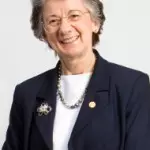
Her interests are focused on global infectious diseases, water, and health.
She is a nationally-respected scientist and educator, and has authored or co-authored 16 books and more than 700 scientific publications.
She produced the award-winning film, Invisible Seas.
2010: Dr. Rita Colwell has been awarded the 2010 Stockholm Water Prize.
1998-2004: She became the director of the National Science Foundation
Dr. Colwell has also served as Chairman of the Board of Governors of the American Academy of Microbiology and also as President of the American Association for the Advancement of Science, the Washington Academy of Sciences, the American Society for Microbiology, and the International Union of Microbiological Societies.
Dr. Colwell is a member of the National Academy of Sciences, the Royal Swedish Academy of Sciences, Stockholm, the American Academy of Arts and Sciences, and the American Philosophical.
She is an honorary member of the microbiological societies of the UK, France, Israel, Bangladesh, and the U.S. and has held several honorary professorships, including the University of Queensland, Australia.
She is also Chairman of Canon US Life Sciences, Inc. and Distinguished University Professor both at the University of Maryland at College Park and at Johns Hopkins University Bloomberg School of Public Health.
1991-1998: She was the President of the University of Maryland Biotechnology Institute, where she remains Professor of Microbiology and Biotechnology (on leave).
1984-1990: Dr. Colwell was a member of the National Science Board.
Dr. Maria Elena Figueroa - Assistant Professor, John Hopkins University - United States of America
Dr. Maria Elena Figueroa coauthored the book chapter "Communication for Participatory Development" that provides technical guidance for the design and evaluation of community level program interventions.
She also coauthored the peer reviewed CCP (Center for Communication Programs) publication Social, Cultural and Behavioral Correlates of Household Water Treatment and Storage, a comprehensive review of behavioral issues related to water treatment in the developing world.
Currently, Dr. Maria Elena Figueroa is Assistant Scientist in the Department of Health.
Behavior and Society at the Johns Hopkins Bloomberg School of Public Health (JHSPH) where she lectures on Health Communication and Behavior Change. She is the Director of the Research and Evaluation Division of the Center for Communication Programs (CCP) at the JHSPH.
And she also serves as Director of the Global Program on Water and Hygiene at the CCP providing technical expertise in this area to the Center’s programs, to the JHU Global Water Initiative, and to the larger community working on water, sanitation and hygiene.
She is also providing technical assistance on research related to face washing and environmental hygiene for CCP programs on trachoma prevention. She is also overseeing the evaluation of HIV prevention programs in Mozambique and in South Africa.
Over the past 15 years, Dr. Figueroa has contributed to the field of applied communication for behavior change on health and development through research conducted in numerous countries including Ghana, Guatemala, Haiti, Honduras, Indonesia, Mexico, Mozambique, Nicaragua, Pakistan, Peru, and most recently South Africa.
Dr. Figueroa’s work has been focused on the understanding of the multi level factors that affect health behavior. Within CCP she has pioneered the use of innovative approaches for formative research, monitoring and evaluation of health communication programs such as the use of projective techniques for the understanding of the normative environment regarding HIV/AIDS behavior in Mozambique, and the use of participatory visual approaches to understand water, hygiene and sanitation practices in Indonesia.
She has also contributed to the development of frameworks for the evaluation of mass media and community level interventions and to the advancement of appropriate methodologies for the evaluation of communication programs, including the use of econometric techniques in regression analysis.
Dr. Jay Graham - Assistant Professor, George Washington University - United States of America
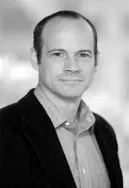
Currently, Dr. Graham is an Assistant Professor in the Departments of Environmental and Occupational Health and Global Health at the George Washington University School of Public Health and Health Services. He is an expert in environmental microbiology with over ten years of international work experience.
Dr. Graham’s current research focuses on developing new approaches to better characterize risk factors associated with pediatric diarrhea and the emergence of novel zoonoses.
Prior to joining the faculty at George Washington, Dr. Graham served as a lead technical advisor on water supply, sanitation and hygiene within the Bureau for Global Health at the United States Agency for International Development (USAID).
1998-2003: He has worked in a variety of countries in Latin America, Asia and Africa, including a long-term position on the US-México border (1998-2003) where he conducted research on the primary prevention of diarrheal diseases and pneumonia within informal settlements of Ciudad Juárez, MX.
Dr. Antar Jutla - Assistant Professor, West Virginia University - United States of America
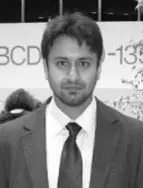
Since 2012, Antarpreet is Assistant Professor at the Department of Civil and Environmental Engineering, West Virginia University, Morgantown.
In 2014, he got the "International Scholar Appreciation Award", West Virginia University, USA.
Since 2013, he hosted the Workshop of Science and Technology, Policy Workshop for Predict the Next Pandemic, White House Conference Center, Washington DC.
Between 2011 and 2012, he was Post-Doctoral Researcher at the National Oceanic and Atmospheric Administration (NOAA), SilverSpring, MD.
His research focuses on the issues :
- Water Resources Engineering and Human Health:
- Quantification of large scale hydroclimatological controls on outbreaks of water‐related diseases (e.g., cholera) and prediction using satellite remote sensing.
- Impact of future climatic variability on outbreak of water‐related diseases.
- Application of remote sensing in detecting large scale geophysical controls and subsequent prediction of most of the water‐related diseases (such as Rift Valley Fever, Schistosomiasis, Malaria, Dengue).
- Hydroclimatology:
- Impact of climate variability on regional precipitation in developing countries;
- flood forecasting,
- scale issues and remote sensing of hydrological processes.
Pr. Philippe Kourilsky - Tenured Professor, Collège de France - France
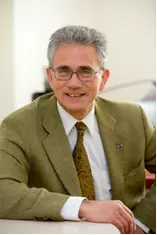
He has written several books : "Les artisans de l’hérédité" (1990), "La science en partage" (1998), "Du bon usage du principe de précaution" (2001), "Le temps de l’altruisme" (2009), as well as more than 350 articles published in international scientific journals.
2000-2005: He was appointed Director General of the Pasteur Institute and chaired the International network of Pasteur Institutes.
Dr Kourilsky is Professor and Chair of Molecular Immunology at the College de France as well as a member of the French Academy of Sciences. In addition, he has taken on the position as the Chairman of the Singapore Immunology Network (SIgN).
1998: Philippe Kourilsky spent most of his career as a member of CNRS (Central National de la Recherche Scientifique) before being elected in 1998 to the College de France where he holds the chair of Molecular Immunology.
1993-1996: Philippe Kourilsky was the Director of Research of Pasteur Mérieux Connaught (now Sanofi Pasteur) a leading vaccine company.
Dr. Jean-Louis Machuron - Founder, Pharmacie et Aide humanitaire - France

Dr. Jean-Louis Machuron is a Pharmacist.
Since 2001: Jean Louis Machuron is active in the area of training; he is the co-organizer of the University Degree in Pharmacie et Aide Humanitaire at the Caen Faculty of Pharmacy (France), and in the French Army Forces’ Health Service.
He is the President of Pharmacie et Aide Humanitaire.
He is also active in the area of integration, as the President of the Plateforme d’Insertion par l’Humanitaire et la Coopération.
He is currently a consultant in charge of field operations at the Mérieux Foundation. In this position, he contributes to improving the evaluation of projects supported by the Foundation.
1996: Dr. Machuron worked with Bernard Kouchner as a consultant at the French Ministry of Health, on compiling the FSTI (International Therapeutic Solidarity Fund), the forerunner to ESTHER, aimed at implementing the first retrovirus treatment in developing countries.
He then led several missions for the French Ministry of Foreign Affairs, notably in Albania (Coordinator for French Humanitarian Action during the Kosovo bombing raids) and in Kosovo (1999-2000), where he worked with the French military and international corps.
1992: In addition to his previous activity, he also developed a purchasing bureau for essential generic medication for NGOs: CHMP (Centrale Humanitaire Médico-Pharmaceutique), in which he is still the Secretary-General:
1985-1996: He was the International President of Pharmaciens Sans Frontières for 11 years. At this position, he participated in numerous emergency humanitarian operations: Romania, Somalia, Artsakh, Iraq, Rwanda, Haiti, Former Yugoslavia, etc.
1985: Dr. Machuron created the NGO Pharmaciens Sans Frontières (Pharmacists without borders).
Dr. Eric Mintz - Centers for Disease Control - United States of America
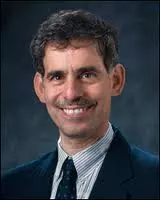
Dr. Mintz has co-authored over 100 journal articles, book chapters, and other scientific publications.
1991: Dr. Mintz joined the Enteric Diseases Branch at CDC as a Preventive Medicine Resident. He is board certified in both Internal Medicine and Preventive Medicine.
Dr Mintz is currently the Leader of the Global Water, Sanitation, and Hygiene Epidemiology team at CDC, where his professional interests include interventions to prevent cholera, dysentery, typhoid fever, and other enteric infections in the developing world.
He has worked on public health projects in Latin America, Africa, and Asia, and holds faculty appointments at the schools of Medicine and of Public Health at Emory University.
1989: He joined the Centers for Disease Control and Prevention as an EIS Officer.
1984-1989: Dr. Mintz received his MD from the State University of New York at Stony Brook, completed a residency at Harlem Hospital, and received an MPH from Columbia University.
Pr. Renaud Piarroux - Professor, Université de la Méditerranée - France

He owns a Ph.D in microbiology.
Currently, Pr. Piarroux works as both a practitioner and a researcher in the area of epidemics and endemic tropical diseases. He directs the department of parasitology and mycology of the Assistance Publique (teaching hospital) of Marseille. In parallel, he participates in the fighting of epidemics in developing countries (Sub-Saharan Africa, Comores, Middle-East, Central America).
He has done numerous epidemiological assessments (epidemiological risks after natural disasters, parasitic diseases, cholera and plague outbreaks) for the World Health Organisation, the French ministry of Foreign Affairs as well as for several NGOs.
Since 2005: He assists the Congolese Ministry of Public Health to draw up and implement a program against cholera in the Democratic Republic of Congo.
1993-2003: He participated to humanitarian missions in Croatia (1993), Democratic Republic of Congo (refugees camps in Goma, 1994), Afghanistan (1995), Rwanda (1996), Honduras (Hurricane Mitch, 1998), Albania (1999), Comoros (9 missions from 1995 to 2000, including management of a cholera epidemic), Democratic Republic of Congo (Goma after eruption of Nyiragongo Volcano, Katanga, Bandundu, 2002-2003).
Dr. Thierry Vandevelde - Executive Officer, Veolia Foundation - France
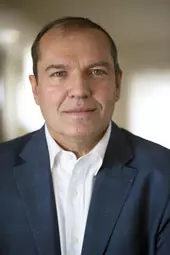
After studying Biology and Information Technology in France, he earned a Ph.D. in Biomathematics from the University of Laval in Canada. Thierry Vandevelde is Chevalier of the French Légion d’Honneur.
Dr. Vandevelde is a member of the Humanitarian Action Guidance Committee set up by the French Government, and of the American Water Works Association.
He is Secretary of the French Committee of the Water Solidarity Program (PS-Eau) and sits on the boards of several International outreach associations.
Since 2008, Dr. Vandevelde is Executive Officer of the Veolia Environnement Foundation, which supports community-oriented projects in favor of sustainable development, in France and abroad. On his impetus, the Foundation intensified the corporate patronage conducted since 1998 by Waterforce, now Veoliaforce.
1998: Within the company, he created a humanitarian action unit, Waterforce, which provides support to the major players in international outreach, in the areas of emergency humanitarian aid and development.
1991-1998: He was the Head of Research Programs, then Director of Technologies in the International Technical Division of Veolia Water.
1989: After spending six years in North America, he joined the Compagnie Générale des Eaux, as the Head of Environmental Conservation.
Dr. Dennis Warner - Senior Technical Advisor, Catholic Relief Services - United States of America
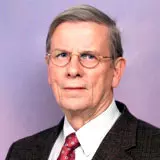
Raised in the Chicago area, Dr. Warner studied history and engineering at the University of Illinois and Stanford University, and received a Ph.D. in civil engineering from the latter.
He has lived in Tanzania, Uganda, Switzerland and France and has held positions with the Peace Corps, University of Dar es Salaam, Duke University, World Health Organization, several engineering consulting firms, World Bank and USAID.
Since 2004: As a member of the CRS Program Quality Support Department, Dr Warner has headed up the development of regional water and sanitation strategies; the strengthening of technical staff resources at the headquarters, regional and country levels; the participation of CRS in coalitions and partnerships with other development organizations; the involvement of CRS in water-related international emergencies and disasters; and the promotion of a water program area within CRS.
Dr. Warner is currently a board member of Pax Christi Metro DC, Falls Church Historical Commission and the Holy Land Christians Society.
2000: Dr. Warner is a Member of Pax Christi, the international Catholic peace movement and in 2000 served as representative of Pax Christi International to the United Nations in Geneva.
